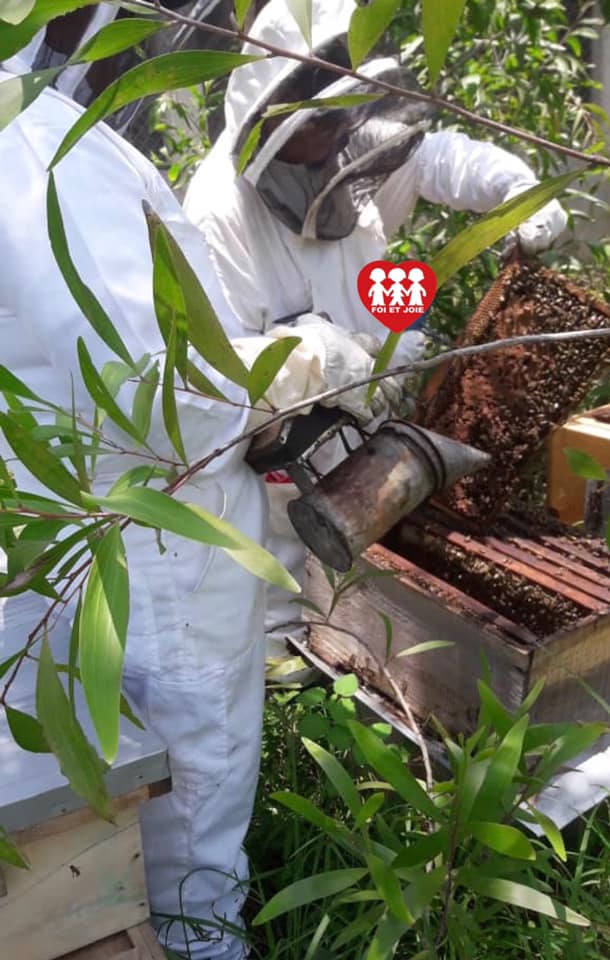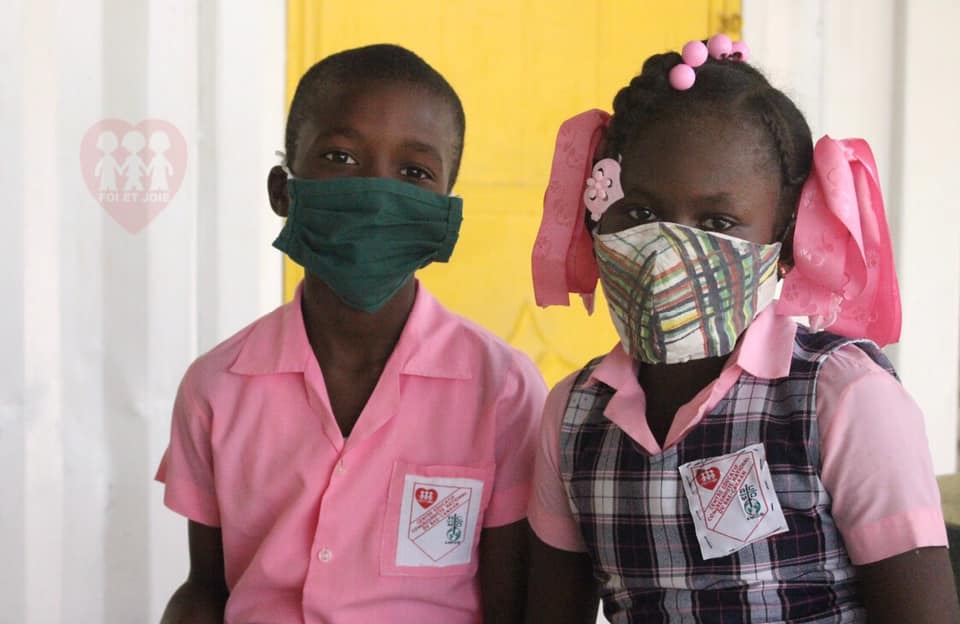By MegAnne Liebsch
December 14, 2020 — In a tranquil patch of sun-dappled forest, Sister Carmen Rodriguez, ODN, gathers her students around a wooden box. She carefully lifts the corrugated tin roof to reveal a teeming ecosystem of honeybees. Wrapped in a protective white jumpsuit and armed with a canister of smoke to keep the bees from swarming, Sr. Rodriguez removes a frame from the hive. Hundreds of bees cling to the frame, but in a few empty spaces, students can see the colony’s tidy work — rows of perfectly hexagonal honeycomb.
Sr. Rodriguez and her students tend to over a dozen hives here. They rise from the forest floor, stacked on cinderblocks in neat rows. Tucked away in the backyard of a school in rural Haiti, this hive system is both a classroom and a business venture. Through beekeeping, students learn about ecology and agriculture, and they can sell the honey to help support their families.
“Let them learn by doing,” says Sr. Rodriguez, paraphrasing a core mantra of Foi et Joie Haiti, which runs the school where she works in Bedou, Haiti.

Foi et Joie is a Jesuit work, part of the larger Fe y Alegría popular education movement, that provides schooling to thousands of children across Latin America and the Caribbean, Africa and Europe. Meaning Faith and Joy in English, the organization runs 17 schools and serves 4,000 children, mainly in rural areas of Haiti. In a country embattled by political instability and chronic poverty, Foi et Joie aims to provide more than education.
“The mission of Foi et Joie, at the end of the day, is not education,” says Nate Radomski, executive director of Magis Americas the official partner of Foi et Joie in the United States. “It’s not to have a school — it’s to transform communities and transform society. They achieve that through education. Education has to be contextual, and education has to provide opportunities.”
Improving quality of life
The beekeeping at St. Ignace de Loyola school in Bedou is one of these initiatives.
“It’s important here because there are no jobs nor means of subsistence other than agriculture,” says Sr. Rodriguez. “We believe that developing local economies helps to improve families’ quality of life.”
Across the island, over half the population lives on less than $3 a day. In Bedou, the reliance on subsistence farming means many families struggle to put food on the table.
The beekeeping initiative will provide students with tangible skills to boost their family incomes. After a year of training with Sr. Rodriguez, students and their parents can keep hives on their own land and sell the honey, creating a “socially responsible beekeeping business” in the Bedou area.
“I love bees and it matters to me that we work with them, respecting and caring for their lives,” says Sr. Rodriguez. An avid beekeeper for nearly 40 years, Sr. Rodriguez wants to share her love of bees and the environment with families in Bedou. The area is rich in flora and fauna that will keep hives healthy — and vice versa. The influx of pollinators will help grow stronger crops and forests, which in turn will improve local diets. Everyone can benefit from this cycle, says Sr. Rodriguez.
Foi et Joie aims to continue the program for the next few years, giving more families the opportunity to join. “Children and their parents have the capacity to learn but resources are needed for support, because they can’t even put food on their own plates, never mind set up any facilities or anything of the like,” Sr. Rodriguez says.
With Foi et Joie’s support, though, families can set up apiaries with few overhead costs, providing vital economic opportunities in an under-resourced area.
Haiti is centralized around the capital, Port-au-Prince. Economic development is sparse outside of the city, forcing Haitians to leave rural communities or migrate. Over 1.6 million Haitians live abroad.
“What Foi et Joie wants to do is improve their educational model so they’re working with the entire community, and not just the immediate schools,” says Radomski. “Students need an education that’s based in practical skills that can lead to economic opportunities.”
Foi et Joie incorporates practical, vocational technical skills into the formal curriculum in their schools. When students graduate, they can apply these skills to create jobs within their own communities. The beekeeping in Bedou embraces this hands-on educational model, and it could rapidly improve life for local families.
Combatting an education crisis
The apiaries will supplement funding at the school, too, since Foi et Joie receives little support from the Haitian government.
Haiti’s education system is about 80 to 95 percent private, so most families pay for K-12 education. For many, school fees are an unaffordable luxury. As a result, only two-thirds of Haitian adults can read and write.
“Because education is privatized, schools are sometimes seen as moneymaking services rather than places that provide fundamental rights,” says Radomski.
Despite the privatization, most teachers are underpaid — if at all. Although the government officially agrees to pay Foi et Joie salaries, teachers have only been paid once since 2011. Radomski says Foi et Joie has had to “get creative” in filling this financial gap.
Bedou’s hives are one way Foi et Joie can keep their schools running. Not only can the school sell honey, but Sr. Rodriguez also hopes to sell small, starter hives to the local community. These funds would help the school in the short-term, and in the long-term, the hives could help farmers could shore up the local economy through beekeeping.
Already struggling with setbacks, Haitian schools were pummeled by crises in 2020. After the Haitian Congress disbanded in January, the president became a de facto dictator. This spurred months of political unrest and violence, forcing schools to close in February.

Then the pandemic hit, and schools remained shuttered. Remote learning isn’t an option for most Haitian children. Most homes lack internet or even cable television. In total, Haitian kids missed nearly half a year of schooling.
Now, schools are scrambling to help students catch up. At Foi et Joie schools, students have spent the fall finishing last year’s curriculum. They will start a new “school year” in January.
School attendance has plummeted at many Haitian schools due to rising attendance fees. Because Foi et Joie does not charge students, their enrollment remained steady.
Despite these challenges, Foi et Joie is forging ahead with new projects to expand their mission. The organization has broken ground at a new training facility for teachers in Haiti’s northeast, and it has announced plans for a new center in Jean-Rabel, Haiti. Now, more than ever, Foi et Joie is committed to working with Haitians to uplift communities — whether through the construction of a new training center or a burgeoning beekeeping sector.
MegAnne Liebsch is the communications associate for the Office of Justice and Ecology of the Jesuit Conference of Canada and the United States. She holds an MA in Media and International Conflict from University College Dublin and is an alumna of La Salle University. She is based in Washington, DC.


